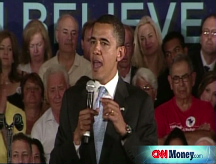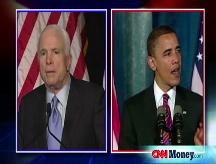McCain vs. Obama: Who will cut small-business taxes?
Each candidate promises breaks for select groups of entrepreneurs, but neither offers what's really needed.
(Fortune Small Business) -- The two presidential candidates are in full Rudolph Valentino mode, breathing sweet nothings into the ears of small-business owners.
"We ... need to keep the IRS from taking more of your income and making life harder for small business," said Republican John McCain at a recent town hall gathering in Portsmouth, Ohio.
Democrat Barack Obama voiced similar sentiments at a rally in Flint, Mich.: "I've ... proposed exempting all startup companies from capital gains taxes.... John McCain would tax them."
That's the rhetoric, but what's behind it? Which candidate's tax policies would best serve small businesses? The answer depends on what kind of company you have and how much you earn.
McCain would extend all the Bush administration's 2001 and 2003 tax cuts. (If the cuts expire as scheduled in 2011, the top marginal rate on individual returns will rise to 39.6% from 35% today. The top estate tax rate will rise to 55%, from 45% today, and the maximum exemption will fall to $1 million, from $2 million today. The top capital gains rate will rise to 20%, from 15% today.)
The Republican nominee would also slash the top corporate tax rate to 25% from 35% and allow all businesses to write off the full cost of capital-equipment purchases in the first year.
Obama says he wants to make corporate taxes more uniform, with lower rates and fewer loopholes. He would extend some of the Bush tax cuts, such as the child-credit expansions and cuts on capital gains and dividend taxes for taxpayers in the 10%, 15%, 25%, and 28% brackets.
But he would eliminate personal income tax cuts that benefit the wealthiest Americans: individuals earning more than $200,000 a year and married couples earning more than $250,000.
That $250,000 figure covers many of the leading business owners who read Fortune Small Business, and it has become a campaign flash point. McCain and his surrogates argue that raising taxes on the wealthiest Americans means raising taxes on the hard-earned success of small-business owners, because many have organized their companies as partnerships and Schedule C corporations, which pay tax at the individual rate.
"If you are one of the 23 million small-business owners in America who file as an individual rate payer, Senator Obama is going to raise your tax rates," McCain said recently.
This is misleading at best, because nobody knows exactly how many of those small-business owners earn more than $250,000 and are taxed as individuals. About 20 million claim business income but have no employees. By that measure, McCain and Obama are both business owners because of their book royalties, as are the millions of salaried employees who occasionally moonlight as consultants.
According to the Tax Policy Center, 663,608 taxpayers with business income (or losses) fall into the top two tax brackets and could be subject to Obama's tax increase. But according to Center fellow Len Berman, many - nobody knows how many - of those taxpayers are not full-time entrepreneurs. "Most owners of small businesses," he says, "have small incomes."
Which gets to the heart of the debate between Obama and McCain. Both say they want to help small-business owners succeed because they generate most of the new jobs in this country. Yet neither tax platform addresses the immediate needs of most small employers.
Cutting corporate tax rates not only doesn't help most entrepreneurs, few of whom pay such taxes, but also puts them at a disadvantage - especially under Obama's plan, which would cut rates on big corporations while raising the top marginal income tax rates that many elite entrepreneurs do pay. McCain vows to cut more taxes than Obama would. But what would be the cost in new federal borrowing and higher interest rates - a major concern of business owners?
One measure that would help all business owners and encourage hiring would be an across-the-board cut in the federal payroll tax, which employers must pay before they earn a cent of profit.
Which candidate is championing that reform? Neither. Why not? Payroll taxes fund Social Security and Medicare. Any candidate who proposed cutting them would have to pay more attention to the looming insolvency of those programs. And neither McCain nor Obama loves small business quite that much. ![]()
Worse off then three years ago: See the full resuts of the Fortune Small Business/Zogby poll.
The estate tax: McCain vs. Obama
McCain backs tax overhaul
Healthcare biggest headache for small employers
-
The Cheesecake Factory created smaller portions to survive the downturn. Play
-
A breeder of award-winning marijuana seeds is following the money and heading to the U.S. More
-
Most small businesses die within five years, but Amish businesses have a survival rate north of 90%. More
-
The 10 most popular franchise brands over the past decade -- and their failure rates. More
-
These firms are the last left in America making iconic products now in their twilight. More














